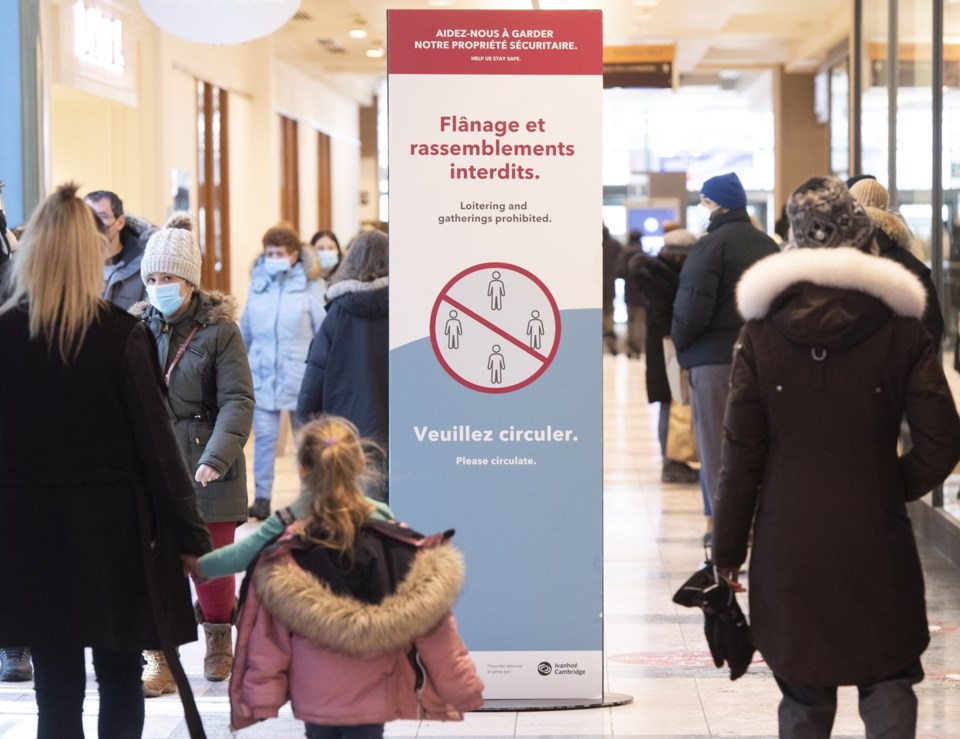MONTREAL — More than two years after Quebec lifted most of its COVID-era public health measures, the province has only recouped a little over one-third of the $68 million it issued in pandemic-related fines.
Quebec had some of the strictest public health measures in the country during the pandemic and was the only province to impose a curfew on its residents. Since the start of COVID-19 in 2020, authorities have issued nearly 44,000 tickets for violations of the provincial public health law, including gathering illegally, failing to wear a mask and breaking the curfew.
The vast majority of those tickets were handed out before the end of 2022 — most COVID restrictions were lifted in the spring of that year.
Two years on, however, the government is still working to get people to pay those fines. As of June 30, the government had recovered $25.2 million — about 37 per cent of the total. The average amount owed per ticket is about $1,500.
Cathy Chenard, a spokesperson for the Quebec Justice Department, says just 17 per cent of offenders pleaded guilty or paid their fines without entering a plea. Another 41 per cent simply ignored the tickets and are liable to be ordered to pay by default. And 42 per cent pleaded not guilty, with some of those cases still winding their way through the legal system.
Caroline Veillette-Jackson, a legal aid lawyer based in Rouyn-Noranda, Que., believes many people who received fines were motivated to fight them because they questioned the legality of the public health measures.
“The level of protest is probably linked to the fact that it was a special, temporary law that enormously restricted people’s freedom,” she said.
The government isn’t expecting to collect the full $67.7 million it issued in fines. Certain tickets may be withdrawn and some offenders acquitted, Chenard said in an email, while other files haven’t yet been decided.
Still, the odds are against anyone who decides to fight their ticket. Chenard said the conviction rate of cases heard at the Quebec court is about 95 per cent. Regardless, plenty of people have chosen to fight, and even to appeal their convictions, meaning certain cases can drag on for years.
One of Veillette-Jackson's clients, Sandra Plante, was among the few to be acquitted earlier this year. Plante was fined in April 2021 for hosting an illegal gathering of six adults. She didn’t deny that she broke the rules, but a judge ruled in her favour because police had violated her rights under the Charter of Rights and Freedoms by entering her property with no reasonable grounds to believe an offence had been committed.
Despite letting Plante off the hook, the judge still had strong words for her decision to host a party in the middle of a pandemic. “This behaviour is marked by pure selfishness and clearly morally reprehensible,” he wrote in a February decision.
Veillette-Jackson said that case proved an important point, even though her client broke the rules. “Just because there were health measures, that didn’t give (police) more power to enter people’s houses,” she said.
But that case was unusual. Dylan Jones, a Montreal-based criminal lawyer, said many people who were fined don’t want to hire lawyers and incur additional costs. Instead, they represent themselves in court — generally without success.
He and Veillette-Jackson both said they think the wave of cases involving COVID-related fines has peaked. “Now it’s a question of recouping the fines or finishing the last batch of cases,” Jones said.
Neither the Justice Department nor Quebec's Crown prosecutor's office provided the number of cases of people fighting pandemic-era tickets that are still before the courts.
Quebec took a punitive approach to the enforcement of public health measures early in the pandemic. A report from the Canadian Civil Liberties Association found that as of June 2020, Quebec had doled out 77 per cent of the fines issued across Canada up to that point.
This past February, a Quebec court judge upheld the province’s pandemic-era curfews, likely the most controversial of the government’s public health measures. Judge Marie-France Beaulieu found the curfews, which were imposed twice in 2021 and 2022, did violate Charter rights, but those violations were justified given the public health context.
That decision is being appealed. Olivier Séguin, a lawyer for the Justice Centre for Constitutional Freedoms who represents the defendant in the case, said public health officials have admitted the purpose of the curfew was in part to send a message about the importance of following the rules.
That objective exceeds the bounds of the provincial public health law, Séguin argues. “It might be allowable to declare a curfew under the public health law to prevent community transmission of the virus,” he said. “But if the purpose of the curfew was to exercise discipline over the population, the public health law didn’t authorize that.”
If the Quebec Superior Court overturns the lower court ruling, Séguin said, the government should reimburse all the fines people have paid for violating the curfew.
This report by The Canadian Press was first published July 30, 2024.
Maura Forrest, The Canadian Press



